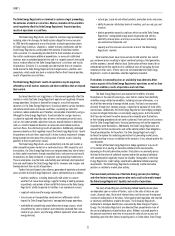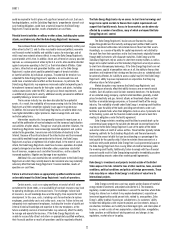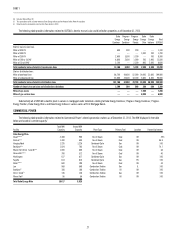Duke Energy 2012 Annual Report Download - page 41
Download and view the complete annual report
Please find page 41 of the 2012 Duke Energy annual report below. You can navigate through the pages in the report by either clicking on the pages listed below, or by using the keyword search tool below to find specific information within the annual report.
PART I
21
The Duke Energy Registrants are involved in numerous legal proceedings,
the outcomes of which are uncertain. Adverse resolution of these matters
could negatively affect the Duke Energy Registrants’ fi nancial position,
results of operations or cash fl ows.
The Duke Energy Registrants are subject to numerous legal proceedings,
including claims for damages for bodily injuries alleged to have arisen prior
to 1985 from the exposure to or use of asbestos at electric generation plants
of Duke Energy Carolinas. Litigation is subject to many uncertainties and the
Duke Energy Registrants cannot predict the outcome of individual matters
with assurance. It is reasonably possible that the fi nal resolution of some of
the matters could require additional expenditures, in excess of established
reserves, over an extended period of time and in a range of amounts that could
have a material effect on the Duke Energy Registrants’ cash fl ows and results
of operations. Similarly, it is reasonably possible that the terms of resolution
could require the Duke Energy Registrants to change business practices and
procedures, which could also have a material effect on their fi nancial position,
results of operations or cash fl ows.
The Duke Energy Registrants’ results of operations may be negatively
affected by overall market, economic and other conditions that are beyond
their control.
Sustained downturns or sluggishness in the economy generally affect the
markets in which the Duke Energy Registrants operate and negatively infl uence
energy operations. Declines in demand for energy as a result of economic
downturns in the Duke Energy Registrants’ franchised electric service territories
will reduce overall sales and lessen cash fl ows, especially as industrial
customers reduce production and, therefore, consumption of electricity and gas.
Although the Duke Energy Registrants’ franchised electric and gas business
is subject to regulated allowable rates of return and recovery of certain costs,
such as fuel under periodic adjustment clauses, overall declines in electricity
sold as a result of economic downturn or recession could reduce revenues
and cash fl ows, thus diminishing results of operations. Additionally, prolonged
economic downturns that negatively impact the Duke Energy Registrants’ results
of operations and cash fl ows could result in future material impairment charges
being recorded to write-down the carrying value of certain assets, including
goodwill, to their respective fair values.
The Duke Energy Registrants also sell electricity into the spot market or
other competitive power markets on a contractual basis. With respect to such
transactions, the Duke Energy Registrants are not guaranteed any rate of return
on their capital investments through mandated rates, and revenues and results
of operations are likely to depend, in large part, upon prevailing market prices.
These market prices may fl uctuate substantially over relatively short periods of
time and could reduce the Duke Energy Registrants’ revenues and margins and
thereby diminish their results of operations.
Factors that could impact sales volumes, generation of electricity and market
prices at which the Duke Energy Registrants’ able to sell electricity are as follows:
• weather conditions, including abnormally mild winter or summer
weather that cause lower energy usage for heating or cooling purposes,
respectively, and periods of low rainfall that decrease the Duke Energy
Registrants’ ability to operate its facilities in an economical manner;
• supply of and demand for energy commodities;
• transmission or transportation constraints or ineffi ciencies which
impact the Duke Energy Registrants’ non regulated energy operations;
• availability of competitively priced alternative energy sources, which
are preferred by some customers over electricity produced from coal,
nuclear or gas plants, and of energy-effi cient equipment which reduces
energy demand;
• natural gas, crude oil and refi ned products production levels and prices;
• ability to procure satisfactory levels of inventory, such as coal, gas and
uranium;
• electric generation capacity surpluses which cause the Duke Energy
Registrants’ non regulated energy plants to generate and sell less
electricity at lower prices and may cause some plants to become
non-economical to operate; and
• capacity and transmission service into, or out of, the Duke Energy
Registrants’ markets.
Coal inventory levels have increased due to mild weather, low natural
gas and power prices resulting in higher combined cycle gas-fi red generation,
and the economy’s overall effect on load. Continuation of these factors for an
extended period of time could result in additional costs of managing the coal
inventory or other costs. If these costs are not recoverable the Duke Energy
Registrants’ results of operations could be negatively impacted.
Fluctuations in commodity prices or availability may adversely affect
various aspects of the Duke Energy Registrants’ operations as well as their
fi nancial condition, results of operations and cash fl ows.
The Duke Energy Registrants are exposed to the effects of market
fl uctuations in the price of natural gas, coal, fuel oil, nuclear fuel, electricity
and other energy-related commodities, including emission allowances, as a
result of their ownership of energy-related assets. Fuel costs are recovered
primarily through cost-recovery clauses, subject to the approval of state utility
commissions. Additionally, the Duke Energy Registrants have hedging strategies
in place to mitigate fl uctuations in commodity supply prices, but to the extent
that these do not cover the entire exposure to commodity price fl uctuations,
or their hedging procedures do not work as planned, there can be no assurances
that the Duke Energy Registrants’ fi nancial performance will not be negatively
impacted by price fl uctuations. Additionally, the Duke Energy Registrants are
exposed to risk that counterparties will not be able to perform their obligations.
Should counterparties fail to perform, the Duke Energy Registrants might
be forced to replace the underlying commitment at prevailing market prices
possibly resulting in losses in addition to the amounts, if any, already paid to the
counterparties.
Certain of the Duke Energy Registrants hedge agreements may result
in the receipt of, or posting of, derivative collateral with counterparties,
depending on the daily derivative position. Fluctuations in commodity prices
that lead to the return of collateral received and/or the posting of collateral
with counterparties negatively impact our liquidity. Downgrades in the Duke
Energy Registrants’ credit ratings could lead to additional collateral posting
requirements. The Duke Energy Registrants continually monitor derivative
positions in relation to market price activity.
Poor investment performance of the Duke Energy pension plan holdings
and other factors impacting pension plan costs could unfavorably impact
the Duke Energy Registrants’ liquidity and results of operations.
The costs of providing non-contributory defi ned benefi t pension plans
are dependent upon a number of factors, such as the rates of return on plan
assets, discount rates, the level of interest rates used to measure the required
minimum funding levels of the plans, future government regulation and required
or voluntary contributions made to the plans. The Subsidiary Registrants
participate in employee benefi t plans sponsored by Duke Energy or Progress
Energy. The Subsidiary Registrants are allocated their proportionate share of
the cost and obligations related to these plans. Without sustained growth in
the pension investments over time to increase the value of plan assets and
depending upon the other factors impacting costs as listed above, Duke Energy
























